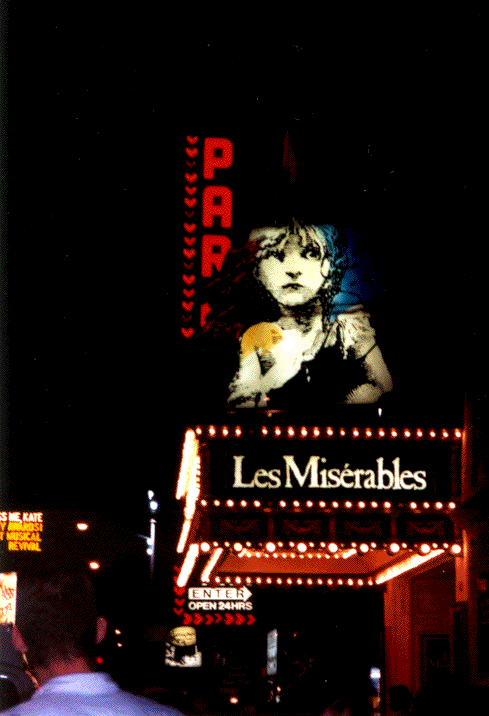 |
| If there was ever a musical to capture the reality of the French Revolution and the power of the human spirit, this would be it. The story is of the convict Jean Valjean who has skipped out on parole to redeem his criminal ways to lead a life of helping others. Indeed he does. With good, honest work, his alias name comes to be known as one of the most gentle persons in France, and he is made Mayor of a large town. He builds a factory, employing many needy people, but when the near-obsessed Inspector Javert sets after him, he must leave. But this is not before the poor mother Fantine comes under his wing. She had worked in his factory, but was laid off when the foreman learned she had a child out of wedlock. Coming down with a fatal disease, she turned to prostitution to support her daughter, who did not live with her, and was almost put in prison by Javert if Valjean had not interfered. She dies, and for his own sake and her daughter's Valjean is on the run again. He finds Fantine's daughter Cosette an abused child working in the inn of the Thernardiers, a nasty couple. With a wealthy bribe, he takes Cosette under his wing and the two leave for Paris. All the while young French blood is growing hot, and the violent revolution is well under way when Cosette is grown into a fine young woman. She meets and falls in love with the young revolutionary Marius, much to the jealousy and despair of Eponine, the Thernardier's daughter, who also has her heart set on him. Meanwhile, Marius's friend Enjolras is leading the revolution with the help of many, including a disguised Valjean, the young Gavroche, and the not-so-helpful realist Grantaire. Javert is also still in his dogged pursuit, and is discovered among the rebels to be a spy for their enemies. He is sentanced to death by Enjolras, but Valjean steps in with the request to do the deed. Him having saved Enjolras from a sniper's bullet earlier, Enjolras agrees. Javert and Valjean confront each other boldy, but in what seems a miraculous act of kindness Valjean lets him go, telling where he can find him later. A long night follows, Valjean pondering the thought of Marius and Cosette, who he has learned of their romance. Marius is at the barricades, supporting his cause, and knows he may very well die. He asks Eponine to deliver a letter to Cosette, and though she has strong feelings for him as well, she does. Upon returning, she is shot by the enemy and dies content in Marius's arms. The brave and young Gavroche is also killed in a noble act of defying the soldiers to collect ammunition from the dead, and that is all before the final battle breaks out. Amid the sounds of firing guns and cannons, Marius is wounded badly, and all others are killed: Enjolras while in the final act of waving their flag and Grantaire finally sobering up to try and help him. Only Valjean survives, and carries a wounded Marius deep into the sewers to get him somewhere safe, encountering a body-robbing Thernardier, and a still hard-set Inspector Javert. Try as he might, Javert cannot find the reason to take Valjean back tp prison through all the good he has done. He tells Valjean to get Marius safe, and when he is alone: kills himself. Meanwhile, Marius is delivered into the safety of Cosette's care, and after recovering from his wounds and his grief, the two are married. Valjean is now old, and his time is coming. He has the strength enough to let is be known that it was him who rescued Marius from the barricades, and to let Cosette know of his true past, before he joins Fantine and the souls of all who died on the barricades. |
|
| Les Miserables is--needless to say--a very powerful show whose music can take you through a variety of emotions: from the happiness at Cosette and Marius's marriage, to the sorrow as the barricades turn and there lies Enjolras beside his fallen flag, to the irony of seeing Thernardier and his wife become rich from their theiving of dead bodies, to the strange mix of either contentment or sadness at Javert's suicide. Very few of the songs are not emotional, and all of them are hard to dislike. I saw the show once on Broadway, and with the exception of the Javert player not being very good (sorry Gregg, I'm being honest), it was perfect. In that performance no song was more powerful than when Marius sang Empty Chairs at Empty Tables, grieving his dead friends. I also had a more personal experience with this spectacular show, but I'll not bore you with that. |
|
| "Give me brandy on my breath, |
|
| And I'll breathe them all to death!" |
|
|
 |
